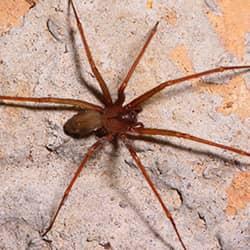Spiders are predatory arachnids with eight legs that are one of the most prevalent household pests in this region within both interior and exterior areas. Despite being long portrayed as spooky and dangerous in the entertainment industry, the majority of house spiders pose no real health risks to humans. Fortunately, the best-known venomous spiders in the U.S., the black widow and brown recluse, are infrequently seen in the Western Massachusetts region.
Why do I have a problem with spiders? Spiders will most likely reside in porch areas when ample sources of flies, moths, and other types of prey exist. Has your porch or other parts of the property become a haven for spiders? A local Western Massachusetts pest control professional knows how to eliminate spiders and how to get rid of spiders on porches.
Why Do Spiders Make Webs On Porches?
Although not all spider species build webs, many will often create silky webs on the front or rear porch areas of properties in Western Massachusetts. As predators of a host of various insects, spiders recognize that many small outdoor critters will seek the overhead shelter that many porches may offer. For example, many front or rear entrances have fixed structural roofs above front porches, awnings made of aluminum or canvas that protect you from the rain, or pergolas, which predominately provide shade from the hot sun.
Keep in mind that these entryways also will likely have exterior lighting that primarily operates after dark that attracts many types of flying insects that spiders eat. Because many consider porch areas to be outdoor areas, many homeowners infrequently clean them, which means that spider webs on porches will remain undisturbed for longer periods than those on a home’s interior.
Are Spiders Attracted To Light?
The majority of spider species have no attraction to light and usually prefer hiding out in dimly lit areas. However, many insects, particularly those like moths, midges, gnats, and mosquitoes, often are drawn to areas of exterior light, which makes it an excellent location for a hungry spider to form a web for ensnaring them. Consider replacing exterior bulbs with the yellowish L.E.D. bulbs now available today that is less attractive to many of these insects.
Exterior Prevention Tips For Spider Control
What are some of the best strategies regarding how to deter spiders and ways how to keep spiders out of your house?
- While spiders themselves have minimal interest in food scraps, many of the small pests they prey upon do; therefore, you should prioritize cleaning outdoor areas following picnics and barbeques.
- Always keep trash bags outdoors inside durable garbage receptacles with tightly-fitting lids that will limit the access of flies, ants, and other types of spider prey.
- Lightly spraying porches and decks with liquids such as vinegar or peppermint oil might deter spiders from the area.
- Keep branches, shrubs, and other types of vegetation near the home trimmed.
- Closely inspect the exterior of the structure for any crevices or gaps that may allow access indoors and fill them with sealant or apply durable weatherstripping.
While eliminating 100% of most pests in outdoor areas is unlikely, minimizing unnecessary clutter, debris, and attractants will significantly help limit the population of these unwanted critters.
Total Home Pest Control For Your Western Massachusetts Home
The experienced team with American Pest Solutions understands how spiders behave and deploys various highly-effective preventative methods. Although our specialists strive to rid the premises of undesirable pests entirely, we also recognize the importance of not compromising the safety of our customers and the local ecosystem. Please feel free to contact our office today to schedule an onsite consultation.

